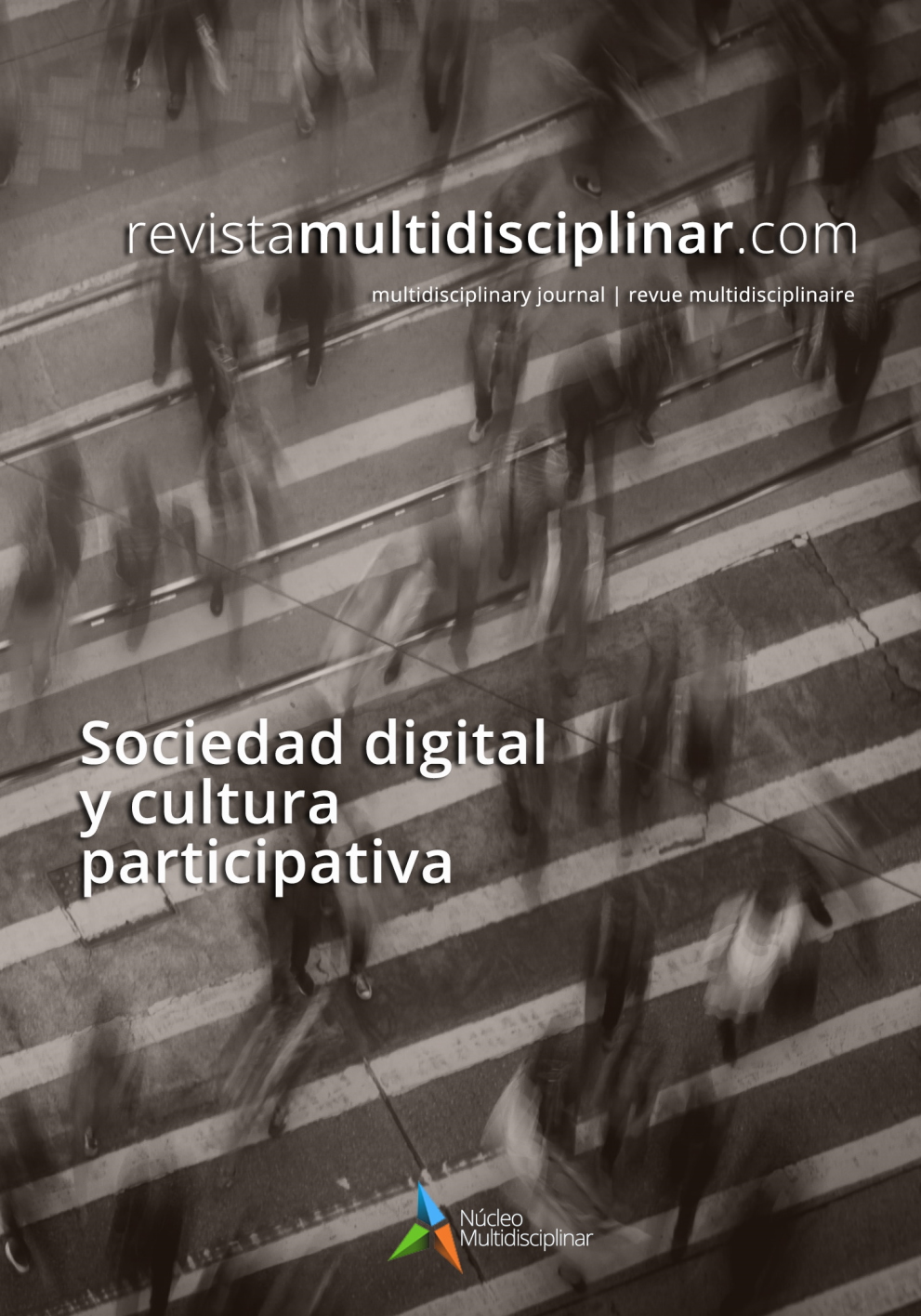Persuasive consumer relations in the digital society and participatory culture
DOI:
https://doi.org/10.23882/rmd.23141Keywords:
digital society, participatory culture, consumption, persuasion, communicationAbstract
This study analyses the digital society and its influence on participatory culture and its relationship from the point of view of persuasive communication in consumption. Examining the way in which social networks affect consumption, how brands use participatory culture to improve their image. The influences of democratization on consumption are analysed, pointing out what precautions the consumer must take when expressing their opinion online. Without forgetting the role of brands in participatory culture. The main results indicate that, although participatory culture can have many benefits, it can also present some dangers. The digital society and participatory culture transform the way we interact with all kinds of information. Although persuasive communication can be effective in promoting products and services, it can also have a negative impact on society, encouraging excessive consumption and manipulating consumer perceptions and emotions. By engaging consumers, brands can use participatory culture to improve their image, engaging consumers and improving the relevance of their products and services.
References
Benkler, Yochai. (2006). Wealth of Networks. How Social Production Transforms Markets and Freedom La riqueza de las redes. [Cómo la producción social transforma los mercados y la libertad], Yale University Press, New Haven and London.
Boyd, Danah. (2014). It's complicated: The social lives of networked teens. Yale University Press.
Bruns, A. (2008). Blogs, Wikipedia, Second Life, and beyond: From production to produsage (Vol. 45). Peter Lang.
Burgess, J., & Green, J. (2018). YouTube: Online video and participatory culture. John Wiley & Sons.
Castells, M. (2004). La era de la información: economía, sociedad y cultura (Vol. 1). Siglo xxi.
Castells, M. (2013). Comunicación y poder. Siglo XXI Editores México.
Chau, C. (2010). YouTube as a participatory culture. New directions for youth development, 2010(128), 65-74.
Checa-Romero, Miriam., García-Varela, Ana. B., del Castillo, Hector., Monjelat, Natalia., & Casas, Xudit. (2011). Cultura participativa y machinima: creaciones audiovisuales en las aulas. En Actas del II Congreso Internacional Sociedad Digital Vol.1. Edita Icono14 Revista de Comunicación y Nuevas Tecnologías.
Corral Velázquez, G. A., & Barba González, R. (2019). Panorama de las prácticas políticas: una aproximación desde cultura participativa y cultura política. Anuario De Investigación de la Comunicación CONEICC, (XXVI), 108-122. https://xurl.es/oc343
De Amo Sánchez-Fortún, J. M., Pérez-García, C., & Oller, J. C. D. (2022). Prácticas letradas vernáculas digitales: análisis de la cultura participativa en espacios de afinidad. Tavira. Revista Electrónica de Formación de Profesorado en Comunicación Lingüística y Literaria, (27), 1101-1101.
Díaz de Cerio Escudero, J. L. (2019). La experiencia de cliente en la era digital. El nuevo viaje del cliente. Trabajo Fin de Grado en Administración y Dirección de Empresas y Grado en Relaciones Internacionales en Universidad de Comillas. https://xurl.es/uuo8u
Garrell, A., & Guilera, L. (2019). La industria 4.0 en la sociedad digital. Marge books.
García-Galera, C., & Valdivia, A. (2014). Prosumidores mediáticos Cultura participativa de las audiencias y responsabilidad de los medios. Comunicar, 22(43), 10–13. https://xurl.es/rgpf9
Jaraba Molina, G., Tejedor Calvo, S., & Cervi, L. (2020). Análisis de las temáticas y tendencias de periodistas españoles en Twitter: contenidos sobre política, cultura, ciencia, comunicación e Internet. Cuadernos. info, (47), 111-137. https://xurl.es/l2ang
Jenkins, H. (1992). Textual poachers: Television fans and participatory culture. Routledge.
Jenkins, H. (2008). Convergence culture: La cultura de la convergencia de los medios de comunicación. Piadós
Lessig, L. (2009). Code, and Other Laws of Cyberspace. Basic Books 10, Perseus Books Group. https://xurl.es/1v9pc
Mateus, J. C., Andrada, P., & Ferrés, J. (2019). Evaluar la competencia mediática: una aproximación crítica desde las perspectivas pedagógica, política y metodológica. Revista de Comunicación, 18(2), 287-301. https://xurl.es/ov1st
Negroponte, N. (1998). Ser digital. Buenos Aires: Atlántida.
Pérez-Escoda, Ana, & Ruiz, Rosa. (2020). Comunicación y Educación en un Mundo Digital Y Conectado. Revista ICONO 14. Revista Científica de Comunicación y Tecnologías Emergentes 18(2), 1-15. https://doi.org/10.7195/ri14.v18i2.1580
Picó, M.-J., Sáez, E., & Galán, E. (2019). Investigación transmedia. Cultura participativa en la creación del conocimiento académico. Profesional De La información, 28(4). https://doi.org/10.3145/epi.2019.jul.14
Ruiz Martín, J., & Alcalá Mellado, J. (2016). Los Cuatro Ejes De La Cultura Participativa Actual. De Las Plataformas Virtuales Al Mediala. Revista ICONO 14. Revista Científica De Comunicación Y Tecnologías Emergentes 14 (1), 95-122. https://doi.org/10.7195/ri14.v14i1.904
Salcedo Maldonado, J. L. (2008). La Riqueza de las Redes. ¿Cómo la Producción Social Transforma los mercados y la Libertad? Foro interno: anuario de teoría política, Vol. 8, 172-176. https://xurl.es/1bi1p
Scolari, C. A., & Establés, M. J. (2017). El ministerio transmedia: expansiones narrativas y culturas participativas. Palabra clave, 20(4), 1008-1041.
Shirky, C. (2009). Here comes everybody: How change happens when people come together. Penguin UK.
Shirky, C. (2010). Cognitive surplus: How technology makes consumers into collaborators. Penguin.
Squire, K. (2011). Video Games and Learning: Teaching and Participatory Culture in the Digital Age. Technology, Education--Connections (the TEC Series). Teachers College Press. 1234 Amsterdam Avenue, New York, NY 10027.
Turkle, S. (1997). La vida en la pantalla. La construcción de la identidad en la era de Internet. España: Editorial Paidos.
Turkle, S. (2020). En defensa de la conversación: el poder de la conversación en la era digital. Ático de los Libros.
Vidales, N. L., & Rubio, L. G. (2014). La democratización del proceso comunicativo en radio: los jóvenes prosumidores. Vivat Academia. Revista de Comunicación, 31-53. https://xurl.es/8jl6o
Vizcaíno-Verdú, A., Bonilla del Río, M., & Ibarra-Rius, N. (2021). Cultura participativa, fandom y narrativas emergentes en redes sociales. Madrid: Dykinson, pp. 1 -980. https://xurl.es/tmmzq
Published
How to Cite
Issue
Section
License
Copyright (c) 2023 Matias López Iglesias, José Luis Carreño Villada , Óscar Díaz-Chica

This work is licensed under a Creative Commons Attribution-NonCommercial 4.0 International License.









